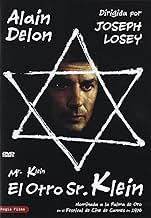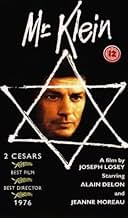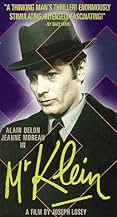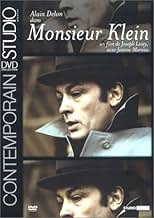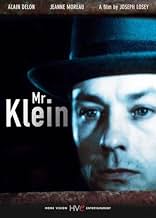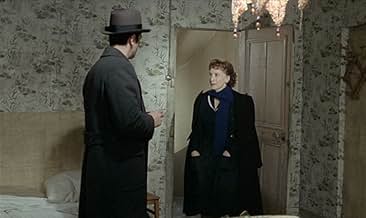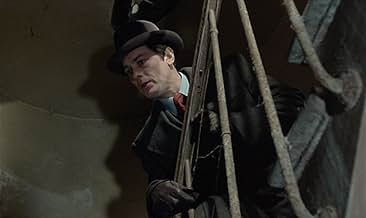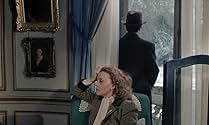Em Paris ocupada pelos nazis, o negociante de arte imoral, Robert Klein, leva uma vida de luxo, até que uma cópia de um jornal judeu o traz à atenção da polícia.Em Paris ocupada pelos nazis, o negociante de arte imoral, Robert Klein, leva uma vida de luxo, até que uma cópia de um jornal judeu o traz à atenção da polícia.Em Paris ocupada pelos nazis, o negociante de arte imoral, Robert Klein, leva uma vida de luxo, até que uma cópia de um jornal judeu o traz à atenção da polícia.
- Direção
- Roteiristas
- Artistas
- Prêmios
- 3 vitórias e 6 indicações no total
- Nicole
- (as Francine Berge)
- Pierre
- (as Michel Lonsdale)
- Lola - la danseuse
- (as Magali Clement)
- Direção
- Roteiristas
- Elenco e equipe completos
- Produção, bilheteria e muito mais no IMDbPro
Avaliações em destaque
Robert Klein is man buying art work at severely reduced prices from desperate Jews, and for him, it's just business. When he receives a Jewish newspaper addressed to him, however, he becomes concerned, less he be suspected of being Jewish himself. His investigation leads him to another Robert Klein, who lived in reduced circumstances, supposedly resembles him, and whose new address has been given as Klein's own.
This is a fascinating film about how, in the end, we all become victims of prevailing injustice. There is a great deal of symbolism throughout; Delon's Klein becomes obsessed with the other Klein, and their lives become inextricably entangled.
After this film, you'll be left with many questions, for which there are probably several answers. Thus is the beauty of "Mr. Klein," a wonderfully directed and acted film. Delon, as an arrogant and confused man, has rarely been better. He is one actor who, due partially to a nice long life, has been able to extend his range beyond staggering good looks and play interesting, challenging characters; he is a producer of this film.
This is highly recommended and certainly a credit to the filmmaking skills of Joseph Losey as well as the taste and talent of Alain Delon.
The story takes place in German-occupied Paris in the winter of 1942. Robert Klein (Alain Delon) is an art dealer who leads a comfortable life by taking advantage of the opportunity to buy at low prices paintings from the collections of Jews who were forbidden to practice their professions or trades and who had to sell household objects, including art, in order to survive. The ambiguity of his Alsatian name puts him in an awkward position when he is mistaken for another, Jewish, Robert Klein and begins to receive the newspaper of the Jewish community. Being a Jew in occupied Paris was more than a social stigma, and in trying to clarify the situation, Mr. Klein became entangled in the intricacies of the Petain regime's bureaucracy. The search for his alter-ego becomes a kind of police intrigue in a world that has become absurd according to the criteria of logic and legality that he had known until then. Gradually, he begins to open his eyes to the extent of the discrimination suffered by the Jews and which he had taken advantage of until then nonchalantly. Trying to prove his own 'national purity', Mr Klein starts to get closer the other Robert Klein, who had endangered, intentionally or unintentionally, his easy existence until then. The two Robert Kleins never meet but their destinies are linked.
The quality of Joseph Losey's film-making is remarkable. Paris under occupation, decadent and indifferent, in which part of the population had adopted the slogans, policies and racial legislation of the occupiers and had become complicit in persecutions and deportations denying the democratic principles of France, is brought to the screen with authenticity and carelessness. Attentive as always to detail, Losey creates various interior sets, from the hero's sophisticated apartment or residence in a castle of the probable mistress of the other Robert Klein to his rented, miserable and rat-infested house or the corridors of the police prefectures. The streets are deserted, cold, hostile and if vehicles appear they are police or Gestapo cars. Music plays an important role in two key scenes, one taking place in the castle, the other in a cabaret. The sound of the phones is as threatening as in Hitchcock's movies. Last but not least, the final scene is probably the first on-screen rendition in a feature film of the arrests and deportations of the Paris Jews from the Winter Velodrome, a historical episode kept under silence until then, which many French would have preferred to forget. Alain Delon builds his role between nonchalance and defiance, between trying to ignore realities and assuming them. Among the actors in the cast, I must also mention Jeanne Moreau and Michael Lonsdale, two formidable actors who are cast here in consistent supporting roles. The ending is debatable and was debated, open to many interpretations that have not, I think, been definitively settled by this day. IMDB mentions that Costa-Gavras also contributed to the script, although he is not listed in the credits. 'Mr. Klein' is a must-see film about occupied France and the attitude of the French towards the Holocaust, a film worth seeing, thinking about and discussing.
"Mr. Klein" is a complex, subtle, scary, and nightmarish film made by a very talented director who had to leave his country, the USA, in the beginning of the 50s and who knew a thing or two about paranoia and hatred multiplied by the power and turned into indifferent killing machine. Once you are inside this machine, "Abandon hope all ye who enter here". Losey's film is often described as a blend of Hitchcock's thrillers where the heroes must deal with the mistaken identity and Kafka's nightmares of "The Trial" and I agree with the description. I only want to add that the film brings to mind Edgar Poe's short story "William Wilson" which was adapted to the screen by Luis Malle as a part of the trilogy "Histoires extraordinaires" (1968) and Alain Delon played both William Wilson and the mysterious man, his double, his conscience, his dark and hidden side. "Mr. Klein" also reminds another underrated, rarely seen but very interesting Ingmar Bergman's film "The Serpent's Egg" (1977) as well as Bob Fosse's masterpiece "Cabaret". The themes of the Feast during the Time of Plague, the helplessness and distress of the terrorized members of society that face the merciless and inevitable force of history and would perish without a trace, are similar in all three movies. Despite these similarities, "Mr. Klein" is an outstanding film on its own merits. What saddens me is the fact that is little known, rarely seen and almost never mentioned even among the film buffs.
Alain Delon's Top 10 Films, Ranked
Alain Delon's Top 10 Films, Ranked
Você sabia?
- CuriosidadesThis was originally going ahead as a Costa Gavras project in 1974.
- Citações
Le vendeur: Six hundred louis.
Mr. Robert Klein: Three hundred.
Le vendeur: You must be joking. At that price, I'd rather keep it.
Mr. Robert Klein: As you wish.
Le vendeur: It's easy for you, when a man is forced to sell.
Mr. Robert Klein: But I'm not forced to buy. I'm not a collector. For me it's just a job.
Le vendeur: Make me a reasonable offer.
Mr. Robert Klein: Three hundred.
- ConexõesFeatured in Les rendez-vous du dimanche: Episode dated 6 March 1977 (1977)
Principais escolhas
- How long is Mr. Klein?Fornecido pela Alexa
Detalhes
- Data de lançamento
- Países de origem
- Idioma
- Também conhecido como
- Mr. Klein
- Locações de filme
- Brasserie La Coupole - 102 Boulevard Montparnasse, Paris 14, Paris, França(Mr Klein called by the bellboy)
- Empresas de produção
- Consulte mais créditos da empresa na IMDbPro
Bilheteria
- Orçamento
- US$ 3.500.000 (estimativa)
- Faturamento bruto nos EUA e Canadá
- US$ 213.769
- Fim de semana de estreia nos EUA e Canadá
- US$ 15.915
- 8 de set. de 2019
- Faturamento bruto mundial
- US$ 219.070
- Tempo de duração2 horas 3 minutos
- Mixagem de som
- Proporção
- 1.66 : 1
Contribua para esta página




